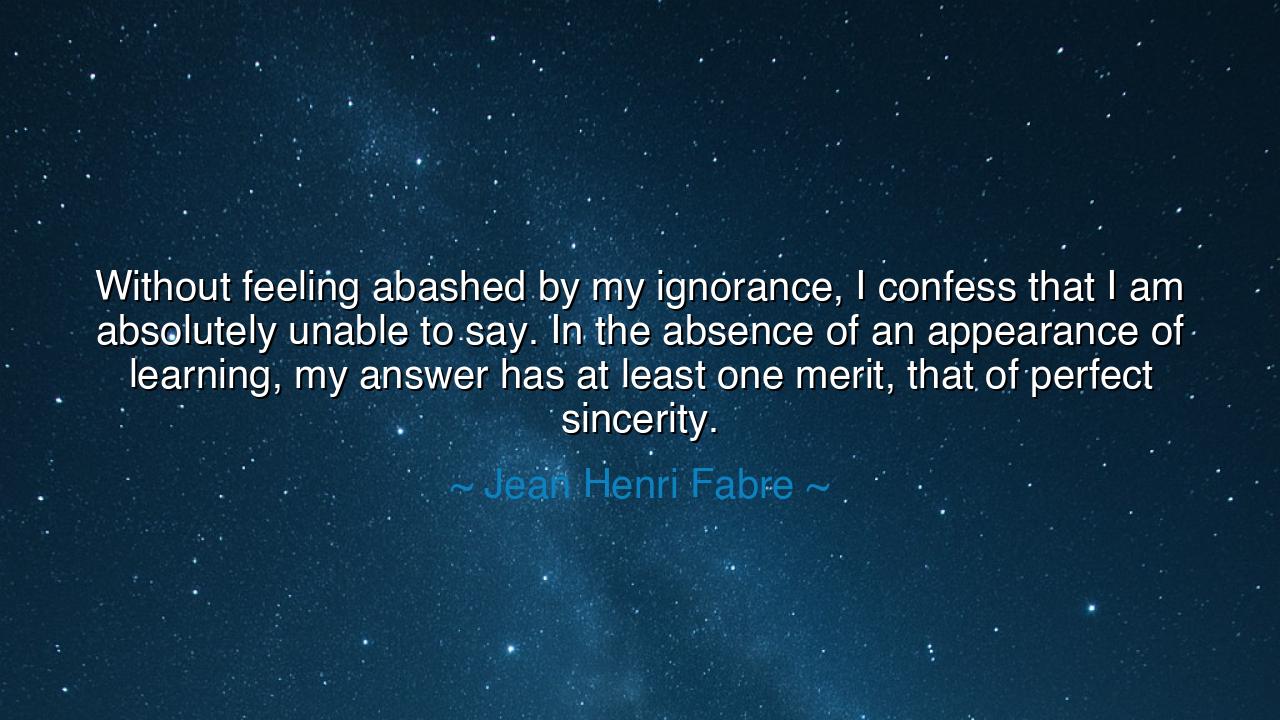
Without feeling abashed by my ignorance, I confess that I am
Without feeling abashed by my ignorance, I confess that I am absolutely unable to say. In the absence of an appearance of learning, my answer has at least one merit, that of perfect sincerity.






In the serene humility of science and truth, Jean Henri Fabre once wrote: “Without feeling abashed by my ignorance, I confess that I am absolutely unable to say. In the absence of an appearance of learning, my answer has at least one merit, that of perfect sincerity.” These words, spoken by one of history’s most patient observers of nature, shine like a small but enduring flame of wisdom. In them lives a principle older than science itself: that sincerity is greater than pretense, and that to confess ignorance with honesty is nobler than to disguise it with vanity.
Fabre, known as the “Homer of insects,” was not a scholar of great institutions but a man of the fields—a self-taught naturalist who spent his life watching the smallest creatures perform their eternal dances of instinct and survival. In an age when science often wore the heavy armor of pride, Fabre’s humility set him apart. He did not seek to impress with grand theories or polished rhetoric. Instead, he chose to admit, with perfect sincerity, what he did not know. To him, ignorance was not shameful—it was the beginning of wonder.
In his studies of insects—the wasp, the scarab, the caterpillar—Fabre often faced mysteries that defied explanation. Why did certain species act with such precision? How could a creature so small possess instincts so exact, yet so unfathomable? When others might have invented theories to fill the silence, Fabre bowed before the unknown and said, “I am unable to say.” That humility did not weaken his legacy—it sanctified it. For wisdom begins not with knowledge, but with the courage to acknowledge what we do not understand.
History offers many mirrors to Fabre’s virtue. The great Socrates, when praised for his wisdom, replied simply, “I know that I know nothing.” His confession was not self-deprecation, but liberation—the recognition that truth lives beyond the boundaries of pride. Likewise, Fabre’s words remind us that learning is not a conquest but a pilgrimage. To admit ignorance is to open the door through which knowledge may finally enter. Those who pretend to know all things close that door forever.
The deeper meaning of Fabre’s quote lies in its moral clarity. In every field—science, politics, art, or life itself—there are those who trade sincerity for the illusion of certainty. They speak not to understand, but to appear wise. Fabre rejects this falsehood. He reminds us that truth cannot live where pride reigns. When he says his ignorance has “one merit,” he is teaching that honesty, though it may appear weak to the proud, is the foundation of all true discovery. The soil of humility is where understanding takes root.
Consider the story of Galileo, who dared to say, “I do not know,” when others claimed certainty in the dogmas of their age. His willingness to question what others accepted blindly led to revelations that changed the world. In the same spirit, Fabre’s humble admission was not a retreat, but an advance—a recognition that every mystery left unsolved is an invitation to deeper inquiry. Such is the eternal dance between curiosity and humility.
The lesson for us is both simple and profound: do not fear ignorance, but fear false wisdom. When you encounter the limits of your understanding, do not hide them—embrace them as the first step toward truth. Speak with sincerity, even if your words reveal uncertainty. The wise do not pretend to know everything; they seek endlessly, listen deeply, and answer honestly.
Thus, Jean Henri Fabre’s confession becomes a timeless creed for all seekers of truth: “My answer has one merit, that of perfect sincerity.” Let this be the measure of our own learning. For the world is not saved by those who speak with arrogance, but by those who, in the quiet honesty of their hearts, admit what they do not yet know—and then, with patience and wonder, begin to learn.






AAdministratorAdministrator
Welcome, honored guests. Please leave a comment, we will respond soon